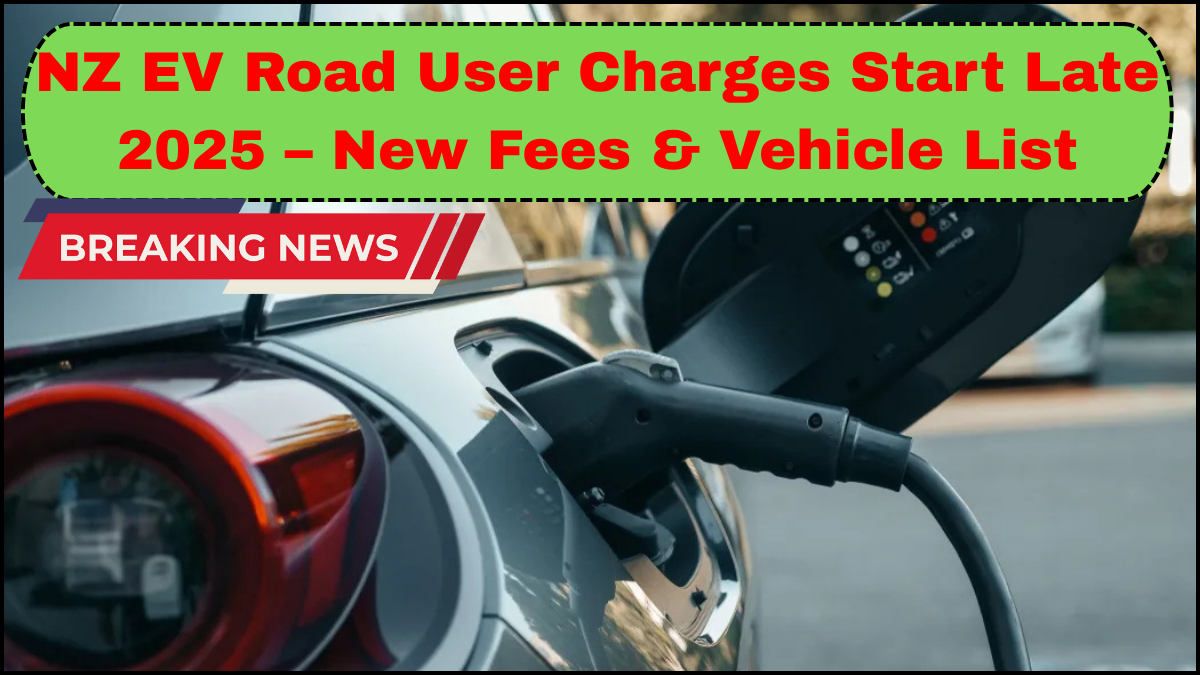Starting in late 2025, New Zealand EV Road User Charges 2025 will officially come into effect, marking a major shift in the country’s approach to electric vehicle (EV) taxation and infrastructure funding. With the steady rise in NZ electric vehicles and the phasing out of certain exemptions, this new system aims to ensure all drivers contribute fairly to road maintenance and upgrades.

Why Are Road User Charges Being Introduced for EVs?
Electric vehicles in New Zealand have, until now, enjoyed an exemption from road user charges (RUCs) to encourage adoption. This policy contributed to a significant uptick in EV sales across the country. However, as EVs become more mainstream, the government is preparing to level the playing field by including them in the RUC framework that already applies to diesel vehicles and heavy transport.
The rationale behind the EV tax 2025 is twofold:
- Equity in infrastructure funding: All road users, regardless of vehicle type, use public roads that require upkeep.
- Revenue sustainability: As fuel excise duty revenue declines due to reduced petrol and diesel use, a new revenue model is needed to sustain road infrastructure investments.
Who Will Be Affected by the New RUCs?
Under the new scheme, the following vehicle categories will be required to pay road user charges starting in late 2025:
- Battery Electric Vehicles (BEVs)
- Plug-in Hybrid Electric Vehicles (PHEVs)
- Hydrogen Fuel Cell Vehicles (FCEVs)
- Electric light commercial vehicles (eLCVs)
Owners of petrol-hybrid cars, which still use fuel and already contribute via fuel excise, will not be included in the RUC changes at this time.
How Will the New Zealand EV Road User Charges 2025 Be Calculated?
RUCs for electric vehicles will be distance-based, much like the existing system for diesel vehicles. The charges are expected to be calculated per 1,000 km travelled, with fees potentially tiered based on vehicle weight and type.
While exact rates are yet to be finalized, here’s a likely structure:
- Light EVs (< 3.5 tonnes): Approx. $76 per 1,000 km
- Heavy EVs (> 3.5 tonnes): Charges will vary more significantly depending on the axle configuration and gross vehicle mass
These rates will be reviewed annually and adjusted in line with road maintenance costs and national transport priorities.
Compliance and Payment Mechanisms
To simplify the process, Waka Kotahi (NZ Transport Agency) will implement digital RUC tracking and payment options. Drivers will be able to:
- Purchase RUC licenses online or through approved agents
- Use in-vehicle telematics systems for automated tracking
- Receive notifications when it’s time to renew or top-up
Failure to comply will lead to fines, as with existing RUCs for diesel vehicles.
Timeline for Implementation
- Mid-2025: Final rate structures and regulations released
- Late 2025: Official start of EV road user charges
- 2026 onwards: Gradual phase-in of additional vehicle classes or adjustments based on compliance data and infrastructure funding needs
Impact on EV Adoption
While some fear that this new tax could slow down the transition to EVs, industry experts suggest otherwise. With ongoing government subsidies, expanding charging networks, and the overall lower running costs of EVs, New Zealand remains on track to grow its EV fleet.
The RUCs, when viewed in context, are modest compared to the long-term savings EV owners enjoy through lower fuel and maintenance costs.
Future Developments
The government is also exploring:
- Dynamic RUC pricing: Higher rates during peak times to manage congestion
- Incentives for rural EV use: Special rates for low-income or remote communities
- Integration with carbon offset programs to further align road use with climate goals
These proposals are still under discussion but signal a move toward a more flexible and fair transport funding model.
Frequently Asked Questions (FAQ)
Q1: Will hybrid vehicles be affected by the New Zealand EV Road User Charges 2025?
A: Only plug-in hybrids (PHEVs) will be subject to the new RUCs. Traditional hybrids using petrol or diesel will continue to pay through fuel excise taxes.
Q2: How do I pay the new RUCs for my EV?
A: Payment will be available online, via mobile apps, or through licensed service providers. You can purchase RUC in advance based on projected mileage.
Q3: Are there any exemptions or discounts planned?
A: The government is considering discounts for low-income households and rural drivers, though these details are still under review.
Q4: Will the new EV tax affect resale values?
A: Likely not significantly. EVs still offer long-term savings and benefits, keeping demand strong in the second-hand market.
Q5: Can businesses claim RUCs as a deductible expense?
A: Yes, in most cases, RUCs can be included as a business operating cost for tax purposes.
click here to learn more